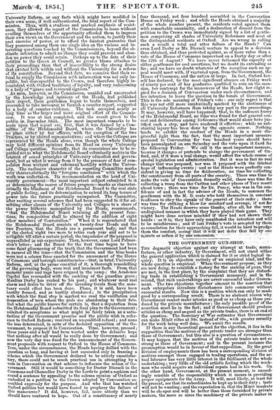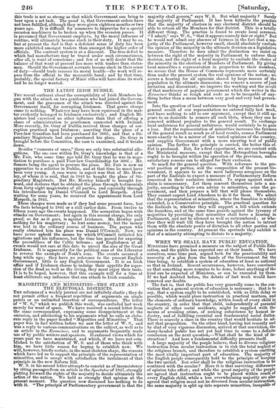THE GOVERNMENT GUN-SHOP.
THE dogmatic objection" agaibit I any attempt at trade, manu- facture, facture, or Other industry, by Goterthnent, will not stand -either the general application which is Claimed for it or strict logieel in- quiry. 'it is an objectiOn ' entirely of an empirical kind, thad the whole' qtestion is empirical. When Government propOse;' as they • are now doing, to establish a factdry for the Making of guns, they are Met, in the first place,by the taniplitint that they are disturb- ing trade in -eitablithineldiferternent Monopoly, and in the -Wood, that such:under ' iigi are neVersnceessful 'tinder Govern- merit. The The two objections ;tegether dimwit to the assertion that such enterprises introduce disturbances into count/Mite without successful results. Now this is a position which can only be made good by a corresponding result. 'There is no abistraet reason why Government cannot Make tirades as good or haTcheap- as those pre- 'duced by the private Maiinfacturer ; the only pOssible-proof of the assertien must lie in the fact; and if Government should rode-0e articles as cheap and as geed as the private trader, there iii.an end of the qneetion:• • The Secretary at'-War estimates that Government can make Millie rifles et 30e: inetetid'of 60s., with greater seetrity for the• WOW being well done. -Vireitnit the results. ' - If there is any theOretkel ground for the objection, it lies in the supposition that the motives of the private trader are stronger than those of Government; but this also is a question of circumstances. It May happen that the motives of the private trader are not so strong 'ite those of Government.; and in the present instance the presumption would be in favour of that supposition. By the great division of employments there has been a oorresponding division of motives amongst those engaged in trading operations, and the ac- tual labourer has very little interest in the fulfilment of the Whole undertaking; very little of the old artistic feeling which the work- man who could acquire an individual repute had in his work. On the other hand, Government, at the present moment, is exceed- ingly sensible of the responsibility Which it incurs in providing proper equipments for the Army. It Will, most likely, at least for the present, see that its subordinates be kept up to their duty; tests will not be wanting; and the expectation is, that the Minie muskets will be cheaper and will be better than those furnished by private makers, the more so since the machinery of the private maker in
this trade is not so strong as that which Government can bring to bear upon a set task. The proof is, that Government orders have not been fulfilled, although they were given eighteen months or two years ago. It is difficult for commerce to improvise for a special occasion machinery to be broken up when the occasion passes. It is presumed that Government employes, by the moral influence of routine, will ultimately become slack in their duty. It may be so, but at present the fact is that a deficient sense of duty has been more exhibited amongst traders than amongst the higher order of officials. The contract system is at a discount. The true defect to which bad menu:facture may be traced under such circumstances, after all, is want of conscience; and few of us will doubt that the balance of that want at present lies more with traders than states- men. Should the Government servants become slack in their sense of duty—should trade recover its moral health—the work will re- pass from the official to the mercantile hand ; and by that time, probably, the special factory of Minie rifles will have done its work and be no longer wanted.

































 Previous page
Previous page